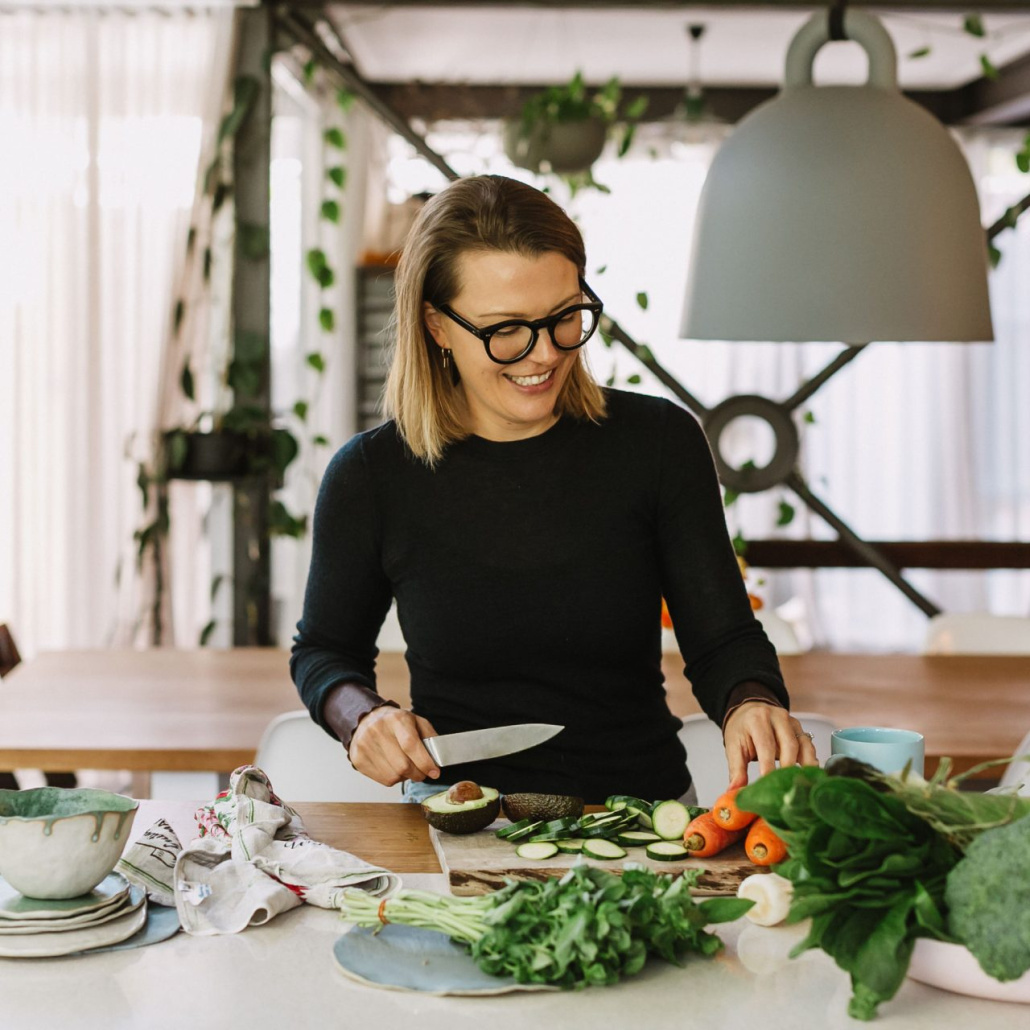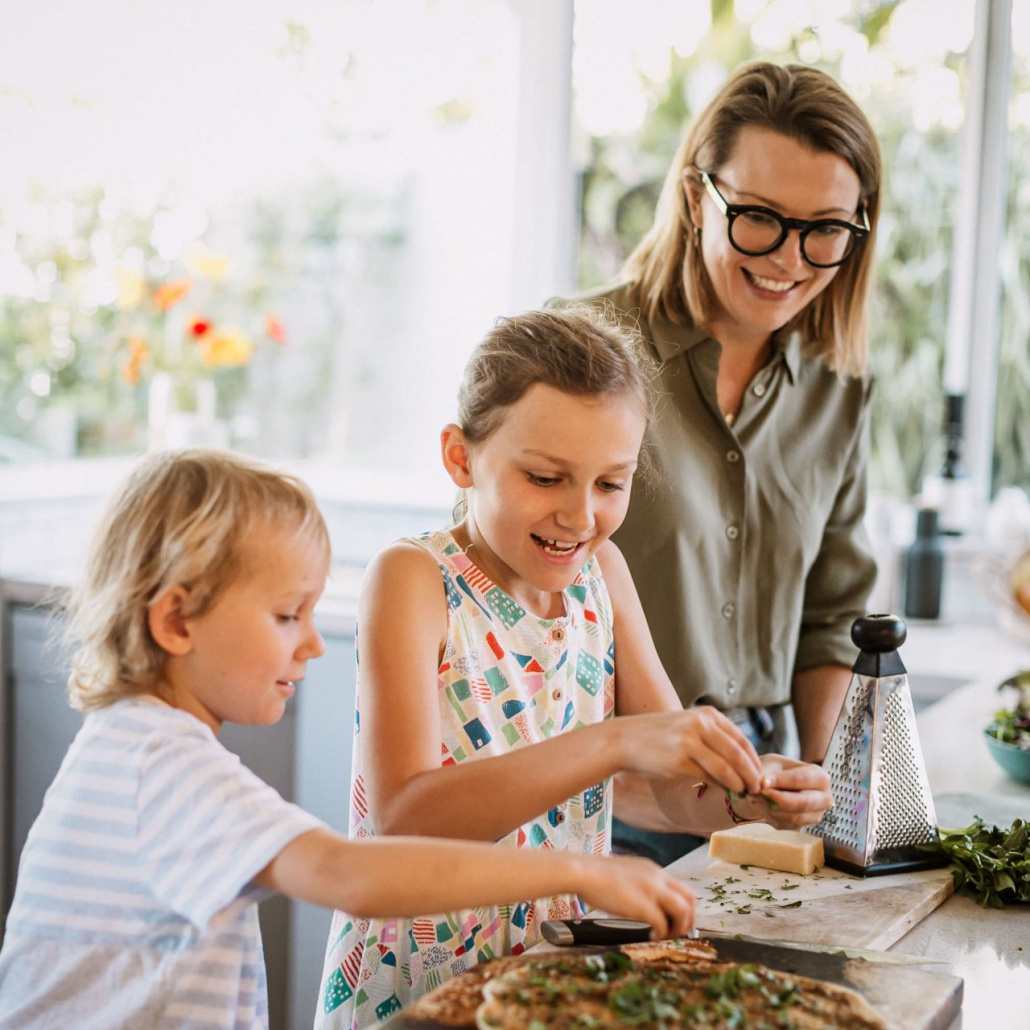
Kellie Montgomery in her home in Bondi, Sydney
- Kids
Kellie Montgomery is Green + Simple’s new kids health expert
Ask her anything
Introducing clinical nutritionist, sustainability advocate and mum of two, Kellie Montgomery who with her life-long passion for holistic living specialises in supporting children’s behavioural, immune, gut, hormonal health and mental health. Over the coming months she will be writing about everything from why she doesn’t buy BPA-free plastic (or any plastic for that matter), how to support the gut health of your kids, ways to reduce your child’s toxic burden, solutions to eczema and more. If you have any burning questions for her, email or DM us and we’ll do our best to answer them for you.

How long have you been a clinical nutritionist and what inspired you to follow this path?
I’ve been in clinical practice for almost three years, and I love everything about it. Both my parents were pretty hardcore Naturopaths, so I grew up with a healthy lifestyle being second nature to me. Back then, it was all unsweetened carob, soy milk, and bread that could be mistaken for a brick. Science around nutrition has changed a lot since then! As an adult, I really appreciate having been brought up with holistic health as second nature, but as a child, it was not always appreciated – especially when we weren’t allowed to go to McDonalds! We literally had the largest McDonald’s in the Southern hemisphere at the end of our street, and we were never allowed to go there.
I’d been working in the film industry as a costume stylist for about a decade and I loved it, but once I had my first child, Olive, it just became so challenging to commit to such long, demanding working hours, and I felt like I needed something to change. I thought about studying Nutrition when I was on maternity leave with her, but the whole idea of studying for so long was so daunting that I went back to work in the film industry. I finally enrolled in my Nutrition degree after my son, Clancy, was born. Suddenly, I was one of those mature-age students that I had found so irritating the first time around – getting flustered with so much info coming at them.

Why are you passionate about kids’ health?
I love working with all types of people, but when I was studying, I just knew I would gravitate towards working with children.I love that when you help a child, you’re actually creating positive change for the whole family. When my daughter started kindergarten, she had some behavioural issues that were putting a whole heap of pressure on our family unit. I ended up taking her to a Nutritionist and did a really simple hair test which showed she had a significant mineral imbalance. I put her on a single mineral supplement, and the change in behaviour was really quite profound, and it had such a positive outcome – not just for Olive, but for all of us.
Can you talk about your holistic approach to kids’ health?
Our personal health is reflective of our food, our environment, even our ancestral patterns of health can impact on our own. From a clinical point of view, much of my focus is to work on improving a child’s gut health. What we eat, how we eat, when we eat, our sleep patterns, and our stress all impact our gut health and that, in turn, affects all the systems in our body and wellbeing.
My other big focus that I set in clinic, is to help clients to build a healthy relationship with food – intuitive eating is something we have moved so far from in Western society, but we need to learn to listen to our body again. We want our kids to learn to eat food that makes them feel good, and most of the time that means eating wholefoods, but every now and then, it also means eating soul foods …. fish and chips followed by an ice-cream.
What are some of the most common complaints symptoms you treat in kids?
The two main things I’m seeing in children in my clinic right now are iron deficiency and anxiety. Often, even, in the same child. Iron is critical to many processes, but especially important for children in terms of growth and brain development, even for good sleep – so having adequate levels is so important.
Some kids simply don’t eat enough, but some are dealing with an insufficiency in gut absorption and dysbiosis of the microbiome (an issue which is just becoming chronic in society), so we need to address that before we will improve the iron levels.
The anxiety I’m seeing is fairly new, and often related to the stresses of the pandemic and the isolation so many kids are feeling through lockdown. It’s really heartbreaking for parents to see the beginnings of mental health issues, and because of that, it’s one of my favourite things to work with – alongside behavioural therapy, nutritional therapy is an incredibly powerful adjunctive tool in the mental health toolbox. And one of the most rewarding to improve. Getting out into nature has never been so important as right now!
What does living a sustainable life mean to you?
Living a sustainable life is so intrinsically linked to living a healthy life; you really can’t have one without the other. Ultimately if we look after the health of the planet, it will help look after the health of us. (And unfortunately, just about all levels of our food systems are polluted to some degree – our water, our soil, our food production… argh!) Sustainability to me on a daily level, is an imperfect, ongoing practice. I am always considerate about the choices I make for my family and I; in terms of food, and waste, and how we can do better. Sometimes it’s easy, but often it’s a delicate balancing act between convenience, affordability and sustainability. Sometimes I feel so completely overwhelmed that it feels altogether hopeless. I’m beyond furious with the inaction from the Australian Govt – it is truly appalling, and galling!
What are three meals you return to your entire family will eat
Tacos, pesto pasta, and pizza. What absolutely mind-numbingly boring answers! But I guess the whole point is, healthy family food needn’t be overly complicated. Cook as much as you can from scratch and base it around wholefoods and you’re already winning.
Both my children have gone through extremely fussy stages so I can relate to the unbelievable frustration of trying to feed kids who are using food as a tool for control. Definitely the meals that work the smoothest, and what I often suggest clients try with fussy eaters, is the “buffet style” of eating – simply plonk everything on the table, and let the kids serve themselves.
